On the morning of December 13, 2024, a delegation from the Educational-scientific Institute of Comparative Educational Policy of Peoples’ Friendship University of Russia, including Professor Vadim Grinshkun (Гриншкун Вадим Валерьевич)from the Department of Continuing Education and Information Technology, Ольмезова София Эдуардовна, Assistant to the Dean, and Wu Rongwei, an expert from the Special Education and Inclusive Education Support Center, visited the Faculty of Education at Shenzhen University for an academic exchange. The meeting was attended by Li Jun, Executive Director, Li Penghu, Deputy Director, Wang Bi, Director of the Party and Administration Office, and Li Wenguang, Director of the Department of Education Information Technology of the Faculty of Education. The session was hosted by Deputy Director Li Penghu.

At the beginning of the meeting, Associate Professor Li Penghu introduced the attendees from Shenzhen University to the delegation. Professor Li Jun delivered a welcome speech, briefly introducing the history and development of Shenzhen University and the Faculty of Education. He noted that the Faculty of Education has established a comprehensive and systematic talent training system, aiming to cultivate high-quality, multidisciplinary teacher education professionals. He also emphasized that with the advancement of new technologies such as artificial intelligence and digitalization, significant changes have occurred in the standards, methods, and content of talent development. This exchange presents a great opportunity for mutual learning in educational technology between the two universities, and he hopes that it will lead to further exchanges and cooperation in the future.
Next, Professor Vadim Grinshkun expressed his sincere gratitude for the warm reception and briefly introduced his delegation members. He pointed out that the Peoples’ Friendship University of Russia, with a history of over 60 years, is a prestigious comprehensive university in Russia, and in recent years, an increasing number of Chinese students have come to study there. Following this, Professor Grinshkun asked questions regarding Shenzhen University’s key disciplinary development, general education curriculum, faculty education system, doctoral program development, and research institution construction. Professor Li Jun answered each question in detail.

Finally, Professor Vadim Grinshkun delivered a lecture titled “The Impact of Digital Technology on Teaching Systems: The Case of Digital Resources and Methods in Russia”. He emphasized that as digital technology gradually matures in the education sector, higher education institutions should reassess the role and significance of digital technology in education. Using textbooks as an example, he explained that while electronic textbooks can offer video and multimedia resources not available in traditional paper textbooks, which enhances teaching efficiency, digital technology cannot provide the hands-on experience required in subjects like physics and electronics. The disconnect between knowledge learning and practical operation can reduce teaching effectiveness. Therefore, the use of teaching technology should be designed based on the specific content of the course. He further emphasized that digital technology should be seen as an auxiliary tool for teaching; it cannot replace the role of teachers, nor is it the core of teaching. The focus should be on setting appropriate educational objectives in the context of digitalization, addressing questions like “Why teach?”, “What to teach?”, “How to teach?”, and “What to teach with?”. He concluded by reiterating the importance of educational goals and emphasized that educational tools such as electronic devices, informational and digital technology should serve teaching and contribute to the primary goal of cultivating high-quality talent.

With this, the meeting concluded successfully.